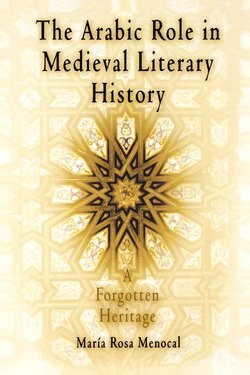The Arabic Role in Medieval Literary History

Реклама. ООО «ЛитРес», ИНН: 7719571260.
Оглавление
Maria Rosa Menocal. The Arabic Role in Medieval Literary History
Отрывок из книги
The Arabic Role in Medieval Literary History
Ruth Mazo Karras, Series Editor
.....
I argue that whatever account we have of a work or a period or of the entire canon is an account that is possible or intelligible only within the assumptions embodied in current professional practice. Rather than standing independently of our efforts, works, periods, and canons have the shape they do precisely because of our efforts, and therefore no act of literary criticism, no matter how minimally “descriptive” can be said to “bypass” the network that enables it. (Fish 1983:357)
But even more engaging than the fact that our paradigms govern us faute de mieux should be the recognition that many of the most widely discussed critical problems of literary history and even theory, particularly as applied to medieval studies, dovetail well with an explicit exploration and reevaluation of the images we hold of the medieval period and the nature of the canon that derives from it directly or indirectly. It seems only logical that in the resurgent discussion of the dialectic of the sameness versus the alterity of the medieval period and its cultural relics, a discussion that tacitly recognizes the parallel and sometimes overlapping dialectic between self and other, we should more closely and explicitly reevaluate our assumptions and knowledge of the often-hidden Other—the Arab, the Semite, the Averroes—who stands silently behind Aristotle in the thirteenth century. Perhaps more to the point, we might ask in this context whether he really was so silent in the thirteenth and fourteenth centuries or whether it is not instead our postrenascentist views and parlance of the period that have made him so, giving his place to others whose ancestry we find more illustrious and thus shielding ourselves from a recognition that strikes at the heart of certain beliefs about ourselves. And is the dialectic that governed the Middle Ages really or exclusively that between pagan and Christian, and between classical and modern, or is this, too, a legacy of the Renaissance view of that period and an ancillary to the colonial and postcolonial view of ourselves?
.....